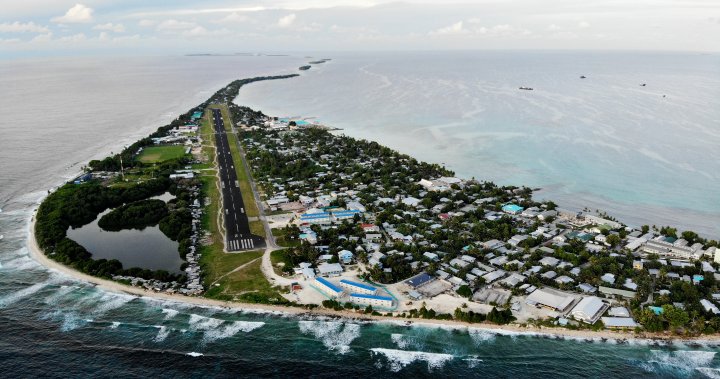With the United Nations’ climate conference, known as COP, underway in Dubai this week amid the usual delegate wrangling to phase out fossil fuels, one Canadian human rights lawyer at the annual event is promoting a different approach to compel nations to lower their emissions.
Payam Akhavan made a name for himself prosecuting the perpetrators of genocides in countries such as Rwanda and Bosnia. He’s now turning his attention to the climate crisis, which he says “brings a radically new chapter to our struggle for survival.”
Akhavan is a professor of international law and senior fellow at Massey College in Toronto. He is also a special adviser to the prosecutor of the International Criminal Court and has represented parties before the International Court of Justice and is a member of the Permanent Court of Arbitration, an international agency that settles disputes between nations.
He is at the UN climate change conference in Dubai, COP28, acting as counsel to the Commission of Small Island states on climate change and international law – in essence, representing three of the world’s smallest countries at the world’s premiere climate summit.
For years, some of the world’s smallest countries – mostly islands in the South Pacific and Caribbean – have begged the international community to take action on climate change.
That’s because rising sea levels put their very existence at risk, they say.
Two years ago, the foreign minister of one of those nations, Tuvalu, stood knee-deep in the ocean and implored attendees at that year’s climate conference, in Glasgow, to make a significant and lasting move to cut emissions. Instead, all delegates managed to get was an 11th-hour, watered-down pledge to reduce coal consumption to produce energy.
Now, with global average temperatures getting closer to 1.5 C of warming over preindustrial norms (1.5 C is the seemingly incremental yet hugely consequential point at which most climate experts agree there’s no turning back), the pressure is on for something beyond the usual voluntary commitments.
Trail smelter case
The waffling that often happens at these UN climate conferences prompted Akhavan to go in and raise the possibility of a different strategy. He picked up on an old case from the 1930s involving pollution coming from a smelter in the town of Trail, B.C.
The smelter, which processed lead and zinc, generated unsafe pollution in the surrounding areas that also wafted across the U.S.-Canada border into neighbouring Washington state.
It took farmers and landowners in that state to form a collective, known as the Citizens’ Protective Association, to get the smelter company’s attention, and eventually the attention of governments in the Canada and U.S.
The Canadian government eventually paid the U.S. restitution for the pollution emanating from the smelter – but the matter wasn’t settled until more than a decade after the case began.
The Trail smelter case was also instrumental in establishing the idea of environmental harm in international law. This principle, Akhavan notes, cements the idea that if an entity pollutes across international boundaries, it can be is compelled to pay for the damages caused by its activities.
“It’s called the principle of transboundary harm,” he says.
UN Convention on the Law of the Sea
The Trail smelter case, on its own, wouldn’t be enough, however, to compel nations to cut their levels of planet-harming pollution. After all, the idea of transboundary harm is hardly novel; pollution has been crossing international boundaries for decades with little in the way of restitution.
So Akhavan needed another mechanism – and that’s when he turned to the UN Convention on the Law of the Sea, known as UNCLOS.
The tribunal for the Law of the Sea, established in 1982, Akhavan says, “is known for its robust jurisprudence. It is known for taking scientific and technical evidence seriously.”
In other words, UNCLOS has teeth. The statute says international maritime boundaries must be respected and protected and that any violations thereof amount to a breach of international law.
Combining the principle of transboundary harm, highlighted in the Trail smelter case, with the UN’s law on protecting maritime boundaries, Akhavan came up with a powerful argument for planetary protection.
Nations, he says, can’t cause transboundary harm, and they can’t violate maritime boundaries.
So, if the pollution produced is going to essentially sink entire countries, then such activity completely goes against international legal statutes. How can you, in other words, protect maritime boundaries when your entire country is at risk of going underwater?
Beyond rhetoric
The question at COP28 in Dubai, like at previous COPs, is: to what extent will the world’s rich, developed nations – countries like Canada and the United States – commit to cutting pollution?
Philippe Le Billon, a professor at the University of British Columbia’s School of Public Policy and Global Affairs, says Canada has long been engaged in a “Faustian bargain” to produce and export fossil fuels while simultaneously pledging to use related tax revenues to develop a clean energy economy.
Le Billon thinks the federal government is reluctant to legally commit itself to emissions reductions at the international level because, as a rule-abiding nation, it would then have to respect its commitments.
“That’s a good thing,” Le Billon says. “But at the same time, it shows that deep down, they’re not really fully committed.”
Jeffrey Qi, a policy advisor with the International Institute for Sustainable Development, an environmental think tank, says Canada “doesn’t want to admit, legally, in writing, that we had a historical responsibility to cause climate change.”
“The rich nations caused climate change in the first place, and now we are passing the buck to developing countries and hoping that they would pick up the slack,” he says. That’s just not right.”
Backchannel diplomacy
Back in Dubai, Payam Akhavan hopes that the Commission on Small Island States will be able to convince bigger, more powerful nations that what’s happening to tiny nations will come knocking to a seaside neighbourhood near them in the near future.
From Miami to Richmond, B.C., the impact of even small rises in sea levels could be catastrophic – to say nothing of the hit faced by developing nations with millions of some of the most vulnerable people in harm’s way.
“We may say, well, who cares about a small island with a population of 10,000?” Akhavan states.
“But if we look elsewhere, like in Bangladesh, which is also a very low-lying, climate-vulnerable country … some 40 million people may become displaced as a result of rising sea levels.
“This is why these smallest of nations on Earth are, in fact, exercising global leadership.”




